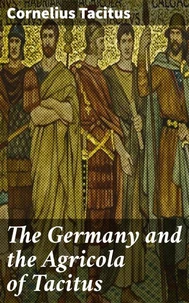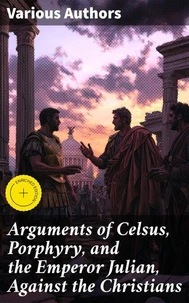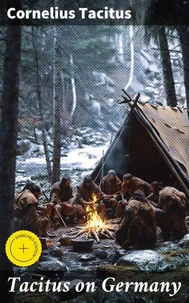The Germany and the Agricola of Tacitus
Par :Formats :
Disponible dans votre compte client Decitre ou Furet du Nord dès validation de votre commande. Le format ePub est :
- Compatible avec une lecture sur My Vivlio (smartphone, tablette, ordinateur)
- Compatible avec une lecture sur liseuses Vivlio
- Pour les liseuses autres que Vivlio, vous devez utiliser le logiciel Adobe Digital Edition. Non compatible avec la lecture sur les liseuses Kindle, Remarkable et Sony
 , qui est-ce ?
, qui est-ce ?Notre partenaire de plateforme de lecture numérique où vous retrouverez l'ensemble de vos ebooks gratuitement
Pour en savoir plus sur nos ebooks, consultez notre aide en ligne ici
- Nombre de pages130
- FormatePub
- ISBN859-65--4725244-3
- EAN8596547252443
- Date de parution04/09/2022
- Protection num.Digital Watermarking
- Taille505 Ko
- Infos supplémentairesepub
- ÉditeurDIGICAT
Résumé
In "The Germany and the Agricola of Tacitus, " the Roman historian Cornelius Tacitus presents a penetrating examination of the Germanic tribes and a biographical account of his father-in-law, Gnaeus Julius Agricola, the Roman governor of Britain. Written in the early second century CE, these texts employ a concise yet profound literary style, combining vivid descriptive imagery with incisive commentary.
Tacitus contrasts the primitive virtues of the Germanic peoples, perceived as noble and unsullied by luxury, with the moral decay of Roman civilization, thus engaging in a subtle critique of imperialism and cultural corruption. This dichotomy underscores the themes of valor and savagery, revealing insights into both the barbaric and civilized worlds of antiquity. Tacitus, born around 56 CE into a prominent Roman family, was deeply influenced by a political climate marked by tyranny and corruption, particularly during the reign of the Emperor Domitian.
His heightened sense of moral integrity and desire for historical justice permeate his writings, prompting a thorough analysis of the dynamics between Rome and the cultures on its fringes. Such experiences provided Tacitus with a unique perspective, allowing him to navigate complex cultural narratives with both empathy and critical distance. Readers of history, literature, or anthropology will find "The Germany and the Agricola" an invaluable resource, offering rich insights into the socio-political dynamics of Rome and its provinces.
Tacitus's eloquent prose invites readers to not only witness but also reflect upon the cultural complexities of the ancient world, making this work a timeless classic still relevant in contemporary discourse.
Tacitus contrasts the primitive virtues of the Germanic peoples, perceived as noble and unsullied by luxury, with the moral decay of Roman civilization, thus engaging in a subtle critique of imperialism and cultural corruption. This dichotomy underscores the themes of valor and savagery, revealing insights into both the barbaric and civilized worlds of antiquity. Tacitus, born around 56 CE into a prominent Roman family, was deeply influenced by a political climate marked by tyranny and corruption, particularly during the reign of the Emperor Domitian.
His heightened sense of moral integrity and desire for historical justice permeate his writings, prompting a thorough analysis of the dynamics between Rome and the cultures on its fringes. Such experiences provided Tacitus with a unique perspective, allowing him to navigate complex cultural narratives with both empathy and critical distance. Readers of history, literature, or anthropology will find "The Germany and the Agricola" an invaluable resource, offering rich insights into the socio-political dynamics of Rome and its provinces.
Tacitus's eloquent prose invites readers to not only witness but also reflect upon the cultural complexities of the ancient world, making this work a timeless classic still relevant in contemporary discourse.
In "The Germany and the Agricola of Tacitus, " the Roman historian Cornelius Tacitus presents a penetrating examination of the Germanic tribes and a biographical account of his father-in-law, Gnaeus Julius Agricola, the Roman governor of Britain. Written in the early second century CE, these texts employ a concise yet profound literary style, combining vivid descriptive imagery with incisive commentary.
Tacitus contrasts the primitive virtues of the Germanic peoples, perceived as noble and unsullied by luxury, with the moral decay of Roman civilization, thus engaging in a subtle critique of imperialism and cultural corruption. This dichotomy underscores the themes of valor and savagery, revealing insights into both the barbaric and civilized worlds of antiquity. Tacitus, born around 56 CE into a prominent Roman family, was deeply influenced by a political climate marked by tyranny and corruption, particularly during the reign of the Emperor Domitian.
His heightened sense of moral integrity and desire for historical justice permeate his writings, prompting a thorough analysis of the dynamics between Rome and the cultures on its fringes. Such experiences provided Tacitus with a unique perspective, allowing him to navigate complex cultural narratives with both empathy and critical distance. Readers of history, literature, or anthropology will find "The Germany and the Agricola" an invaluable resource, offering rich insights into the socio-political dynamics of Rome and its provinces.
Tacitus's eloquent prose invites readers to not only witness but also reflect upon the cultural complexities of the ancient world, making this work a timeless classic still relevant in contemporary discourse.
Tacitus contrasts the primitive virtues of the Germanic peoples, perceived as noble and unsullied by luxury, with the moral decay of Roman civilization, thus engaging in a subtle critique of imperialism and cultural corruption. This dichotomy underscores the themes of valor and savagery, revealing insights into both the barbaric and civilized worlds of antiquity. Tacitus, born around 56 CE into a prominent Roman family, was deeply influenced by a political climate marked by tyranny and corruption, particularly during the reign of the Emperor Domitian.
His heightened sense of moral integrity and desire for historical justice permeate his writings, prompting a thorough analysis of the dynamics between Rome and the cultures on its fringes. Such experiences provided Tacitus with a unique perspective, allowing him to navigate complex cultural narratives with both empathy and critical distance. Readers of history, literature, or anthropology will find "The Germany and the Agricola" an invaluable resource, offering rich insights into the socio-political dynamics of Rome and its provinces.
Tacitus's eloquent prose invites readers to not only witness but also reflect upon the cultural complexities of the ancient world, making this work a timeless classic still relevant in contemporary discourse.







